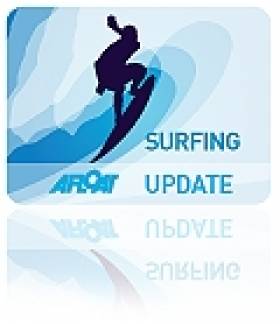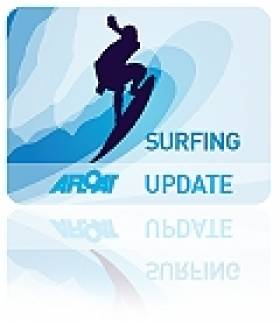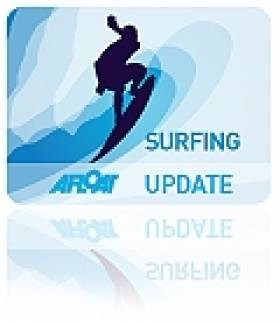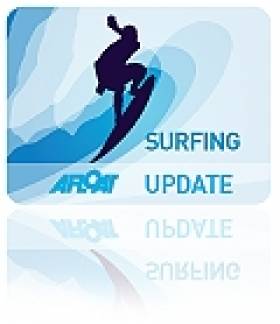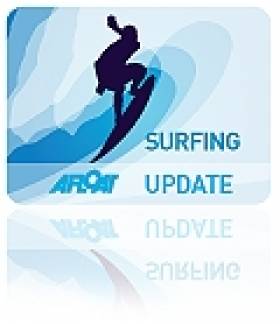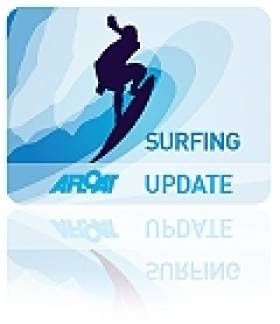Displaying items by tag: Surfing
Prowlers Could Boost Tourism in West
The 50ft monster waves that arose off Ireland's west coast last week could provide a significant boost to tourism in the region.
Ethna Murphy of Fáilte Ireland told The Irish Times that images and news reports of the Prowlers waves has given them "priceless publicity" ahead of next autumn's European Surfing Championships in Bundoran.
"Those photographs will be in every surfing magazine in the world that matters and that is how we attract visitors to Ireland," added Killian O'Kelly of Bundoran's TurfnSurf Lodge surf school.
Last week's Fáilte Ireland conference on adventure tourism in Killarney was told that the market is worth over €1 billion annually, attracting over a million visitors to Ireland each year.
Prowlers has enhanced Ireland's already growing reputation as one of the top cold-water surfing spots in the world.
But the location of the giant waves as yet remains a secret known only to a handful of intrepid surfers.
Giant Prowler Wave Location Remains Secret
According to a Press Association report one of the six-man team, Briton Andrew Cotton, first spotted it several years ago while on board an Irish Coast Guard helicopter after being rescued from a surf accident off Mullaghmore, Co Sligo.
Last night some west coast surfers told Afloat.ie the location is most likely off the Sligo coast, up to two kilometres offshore and close to an underwater reef.
The terrifying-looking wave, dubbed 'Prowlers', was reportedly up to 50ft high on Tuesday when the Irish, British, Australian and South African surfers ventured out. Photos of it appeared on the front page of the Irish Times yesterday.
The surf team included Bundoran's Richie Fitzgerald who says he had waited for five years for the type of conditions required to surf it and on Monday the waves were in the 40-50ft range. Conditions were perfect due to the massive swell generated by Hurricane Tomas.
Rossnowlagh Intercounties This Weekend
Surfers from across the country will be converging on Donegal this weekend for the annual Rossnowlagh Intercounties from 16-17 October.
The All-Ireland event in Ballyshannon is a team competition, and is seen as an important social gathering for Ireland's surfing community.
Current forecasts for Rossnowlagh are showing low waves for the start of the weekend, with the swell expected to pick up on Sunday afternoon - which is sure to heat up the latter stages of the contest.
Portrush Surf Cam Goes Live
Surfing action from Portrush can now be enjoyed from all around the world following the launch of a live webcam at Whiterocks Beach.
Martin Kelly of Portrush Surf School teamed up with the town's Royal Court Hotel to set up the webcam at the popular surfing spot as a tool for travelling waveriders to check out conditions from a distance.
"By checking the webcam they can now see first hand exactly what the waves are doing, saving them time and money on a potentially wasted journey," the former Irish surfing champion told the Coleraine Times. "This is a case of know before you go."
The movable camera will allow for many different views of the Co Antrim beach that will surely appeal to more than surfing fans.
To view the webcam visit www.portrushsurfschool.com
Donegal Surfers Celebrate Top Showing at Easkey
John Britton of the famous Rossnowlagh surfing dynasty was among the winners at the Billabong Easkey Open in Co Sligo last weekend. (SCROLL DOWN FOR GREAT YOUTUBE VID)
The national school teacher from Ballyshannon took the senior title home to Donegal, site of next year's European Surfing Championships.
But Britton wasn't the only Donegal resident to enjoy success at Easkey, the final stop of the Irish Championships Tour.
Nicole Morgan from Tullaghan came tops in the women's event, retaining her Irish championship title. And although missing out on the national title, Emmet O’Doherty from Bundoran won out in the stand up paddle.
Junior talent Iarom Madden Travers from Bundoran also showed skill in the open finals, coming third behind Aaron Reid from Sligo and first place Fergal Smith from Mayo.
Surfers Claim Harbour will Destroy Top Wave
Surfers in Co Clare and around the world are claiming that a proposed pier development at Doolin will ruin one of the world's top surf spots, Crab Island.
The breaks at Crab Island feature in the Footprints guide to the top 100 surf spots in Europe, and it is thought to be one of the top three spots in Ireland to surf.
The new pier protruding from the coast in the lee of Crab Islandhas been put forward by the Council as a means to enable ferry owners easier access to the Aran Islands route. However, the ferry owners have themselves objected to the proposed structure as insufficient to withstand western swells or provide adequate cover. They have lobbied the council for changes to the design.
The positioning of the new pier, some 100 metres south of the existing structure, could cause wave reflection and refraction to a degree that would kill the wave at Crab Island entirely, and cause a classic regional surf spot to be lost forever. Developing the pier on same site as the existing pier, which would cause less disruption, was rejected out of hand by the council as more expensive.
The southern option was said to have a 'lesser impact on existing users' of the area, howver, no mention of the wave or of surfing is made in the Council's submission documents, nor was there any public consultation, as recommended by a report made this year. The project has already gone to tender.
Among the objectors who have made formal written objections to the pier project are surf groups, tourists from the UK and US, and those whose livelihoods rely on surf tourism, such as surf clubs and board shapers.
The objections have also been echoed on surf sites in America and Australia.


























